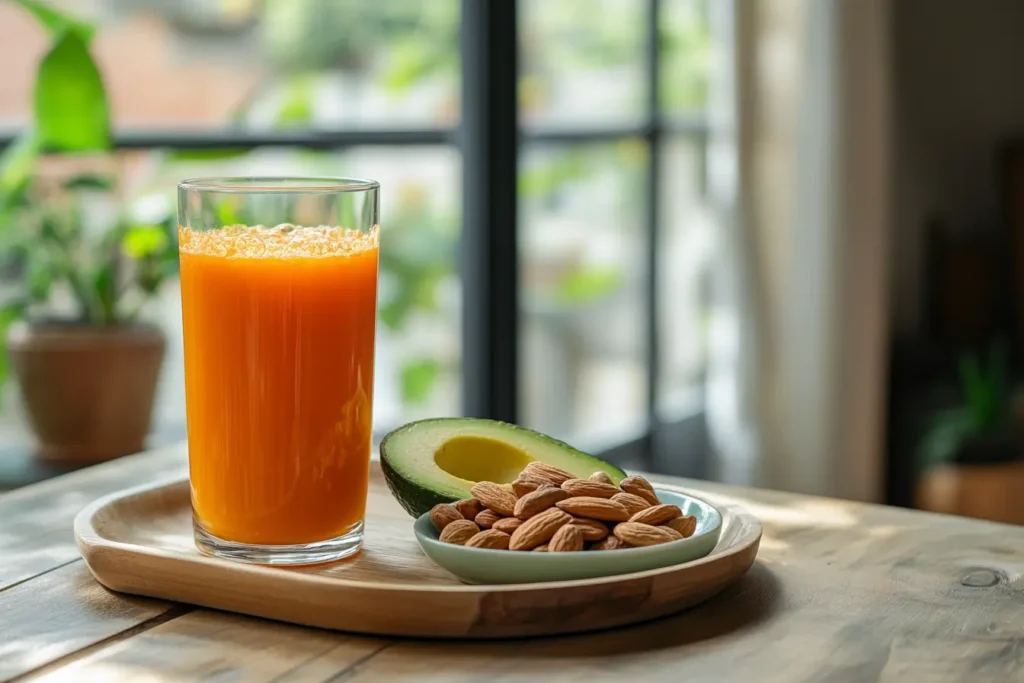Introduction
Carrot juice has gained massive popularity among health-conscious individuals, wellness influencers, and everyday people looking for a nutrient-rich beverage. Its naturally sweet flavor and vibrant orange hue make it an appealing choice for anyone seeking a health boost. Known for its impressive supply of vitamins, minerals, and antioxidants, carrot juice is often praised for improving vision, enhancing skin health, and supporting the immune system. However, can too much carrot juice be bad?
While drinking carrot juice in moderation offers numerous health benefits, overconsumption can lead to several health risks. This article will answer the question, “Can too much carrot juice be bad?” by exploring the nutritional components of carrot juice, its health benefits, and the potential side effects of drinking too much. By understanding the right way to enjoy carrot juice, you can reap its benefits without compromising your health.
Table of Contents
Nutritional Profile of Carrot Juice
To understand whether too much carrot juice can be bad, it’s essential to first examine its nutritional profile. Carrot juice is packed with essential vitamins, minerals, and antioxidants that contribute to overall wellness. However, its concentrated form also comes with certain drawbacks.
For a deeper dive into how carrot juice can support your health, check out The Ultimate Guide to Carrot Juice Recipe.

Key Vitamins in Carrot Juice
Carrot juice is a powerhouse of vitamins that play vital roles in bodily functions. Most notably, it is high in beta-carotene, which the body converts into vitamin A. This vitamin is crucial for maintaining healthy vision, supporting the immune system, and promoting skin health. Additionally, carrot juice is rich in vitamin C, known for boosting immunity and aiding in collagen production for skin repair. The presence of vitamin K supports blood clotting and bone health, while vitamin E serves as a potent antioxidant, protecting cells from damage. Moreover, carrot juice contains B vitamins like niacin (B3) and biotin (B7), both important for energy metabolism and skin health.
Learn more about safe consumption in How Much Carrot Juice Should I Drink a Day?
Essential Minerals
Carrot juice also contains vital minerals, such as potassium, which helps regulate blood pressure and fluid balance, and magnesium, essential for muscle and nerve function. Additionally, the presence of iron aids in oxygen transportation in the blood, supporting energy levels and preventing anemia.
If you’re curious about other juice options, explore What Is Homemade Carrot Juice Good For?.
Antioxidants
One of the most significant benefits of carrot juice is its high antioxidant content. It contains beta-carotene, lutein, and phenolic compounds like p-coumaric, chlorogenic, and caffeic acids, all of which help combat oxidative stress and reduce inflammation. These antioxidants protect the body from damage caused by free radicals, lowering the risk of chronic diseases.
Discover creative ways to pair carrots with other foods in What Fruits Pair with Carrots?
Natural Sugars and Fiber Content
Although carrot juice is naturally sweet due to its sugar content, it lacks fiber. Juicing removes most of the fiber found in whole carrots, which can negatively impact digestion and blood sugar regulation. For example, one cup of canned carrot juice contains about 94 calories, 22 grams of carbohydrates, and 9 grams of sugar. Without fiber, these sugars are rapidly absorbed, which can lead to blood sugar spikes.
Need inspiration? Try the refreshing combinations in How to Make Peach Juice Nectar.
Raw Carrots vs. Carrot Juice
| Nutrient | Raw Carrots (1 Cup) | Carrot Juice (1 Cup) |
|---|---|---|
| Calories | 52 | 94 |
| Carbohydrates | 12g | 22g |
| Sugars | 6g | 9g |
| Fiber | 3.6g | <1g |
| Vitamin A (RAE) | 509mcg | 2,256mcg |
Comparing raw carrots to carrot juice reveals a higher concentration of nutrients in juice form but a significant reduction in fiber, which raises concerns about digestive health and blood sugar regulation.
If you’re curious about preparation tips, read Should You Soak Carrots Before Juicing?.
Health Benefits of Carrot Juice
Carrot juice offers a variety of health benefits due to its dense nutritional profile. However, moderation is crucial to prevent adverse effects. Understanding these benefits can help answer the question, “Can too much carrot juice be bad?”

Rich in Antioxidants
Carrot juice is loaded with antioxidants, primarily beta-carotene, which converts to vitamin A in the body. Antioxidants play a vital role in protecting the body from oxidative stress, which can lead to chronic diseases such as heart disease and cancer. Regular consumption of carrot juice helps the body neutralize harmful free radicals, reducing inflammation and supporting long-term health.
Boosts Eye Health
The link between carrot juice and eye health is well-established. Vitamin A and lutein in carrot juice are essential for maintaining good vision. They prevent conditions like night blindness and age-related macular degeneration. Drinking carrot juice in moderation can contribute significantly to eye health, but excessive consumption might lead to health issues due to high vitamin A intake.
Supports Heart Health
Carrot juice is beneficial for heart health due to its high potassium content, which helps regulate blood pressure. Additionally, carotenoids in carrot juice support cholesterol reduction, lowering the risk of cardiovascular diseases. Studies have shown that drinking 16 oz of carrot juice daily for three months can help lower systolic blood pressure, improving heart health.
Strengthens the Immune System
Carrot juice contains vitamin C and vitamin A, both of which are crucial for a strong immune system. Vitamin C promotes the production of white blood cells and helps in faster wound healing, while vitamin A protects mucous membranes, acting as a barrier against infections. Drinking carrot juice can be a natural way to support your immune system, but balance is important.
Promotes Skin Health
Carrot juice can improve skin health due to its high beta-carotene and vitamin C content. Beta-carotene gives the skin a healthy glow and protects it from sun damage, while vitamin C aids in collagen production, helping to maintain skin elasticity and prevent wrinkles. However, too much carrot juice can lead to carotenemia, causing skin discoloration.
Potential Risks and Side Effects of Carrot Juice
Despite its many health benefits, consuming too much carrot juice can be bad for your health. Overconsumption can lead to several side effects that may outweigh its advantages.

High Sugar Content and Blood Sugar Spikes
Carrot juice’s high natural sugar content can lead to blood sugar spikes, especially since juicing removes fiber that slows sugar absorption. This can be particularly harmful to people with diabetes or insulin resistance. Drinking large amounts of carrot juice daily can contribute to glucose imbalances and weight gain.
Carotenemia: Skin Discoloration
Excessive intake of beta-carotene from carrot juice can cause carotenemia, a condition where the skin turns yellow or orange. Although it’s harmless, it can be alarming and is a clear indicator of overconsumption.
Vitamin A Toxicity
Drinking too much carrot juice can lead to excessive vitamin A intake, especially when combined with supplements. Symptoms of vitamin A toxicity include nausea, dizziness, headaches, and even liver damage in severe cases.

Digestive Issues and Fiber Loss
Since juicing removes most of the fiber, drinking too much carrot juice can lead to digestive problems such as bloating, gas, and diarrhea. Fiber is crucial for healthy digestion, and its absence can negatively affect gut health.
Drug Interactions
Vitamin K in carrot juice can interfere with blood-thinning medications like warfarin. This interaction can reduce the effectiveness of the medication, posing a risk for individuals on blood thinners.
How to Consume Carrot Juice Safely
To avoid the risks associated with drinking too much carrot juice, moderation is key. A recommended serving size is 4–5 oz per day. Combining carrot juice with other vegetables like ginger, beets, or lemon can balance the nutrient intake and reduce sugar concentration.
Eating whole carrots instead of drinking juice provides essential fiber that aids digestion. Including healthy fats in your diet, such as avocados or nuts, can improve the absorption of fat-soluble vitamins like vitamin A.

Conclusion
Carrot juice is a nutrient-rich drink that offers numerous health benefits, including better vision, improved skin health, and a stronger immune system. However, drinking too much carrot juice can be bad for your health, leading to issues like carotenemia, vitamin A toxicity, and blood sugar spikes. Moderation and balance are essential. Enjoy carrot juice as part of a varied diet, and consult a healthcare provider if you’re unsure about the right amount for you.
Interested in exploring more about healthy eating? Check out Is It OK to Drink Carrot Juice Every Day?.
FAQs About Carrot Juice
Can Drinking Too Much Carrot Juice Be Harmful?
Yes, drinking too much carrot juice can be harmful. Excessive consumption can lead to carotenemia, a condition where the skin turns yellow-orange due to high levels of beta-carotene. Additionally, too much vitamin A from carrot juice may cause toxicity, leading to symptoms like nausea, dizziness, and even liver damage. The high natural sugar content can also spike blood sugar levels, posing risks for diabetics and people with insulin resistance.
Can Too Much Carrot Be Harmful?
Yes, consuming too many carrots, especially in juice form, can be harmful. Overeating carrots can result in carotenemia and contribute to vitamin A toxicity if combined with supplements. Although whole carrots have more fiber than juice, eating them in large amounts can still cause digestive discomfort and impact nutrient balance.
When to Avoid Carrot Juice?
You should avoid or limit carrot juice if you:
- Have diabetes or insulin resistance due to its high natural sugar content.
- Take blood thinners like warfarin, as vitamin K in carrots can interfere with the medication.
- Are prone to allergic reactions to carrots, celery, or birch pollen.
- Are pregnant and consuming high amounts of vitamin A from supplements and juice.
Is Carrot Juice Full of Sugar?
Yes, carrot juice contains a significant amount of natural sugars. One cup of carrot juice has around 9 grams of sugar and 22 grams of carbohydrates. While natural, these sugars can still lead to blood sugar spikes, especially since juicing removes most of the fiber that slows sugar absorption.

